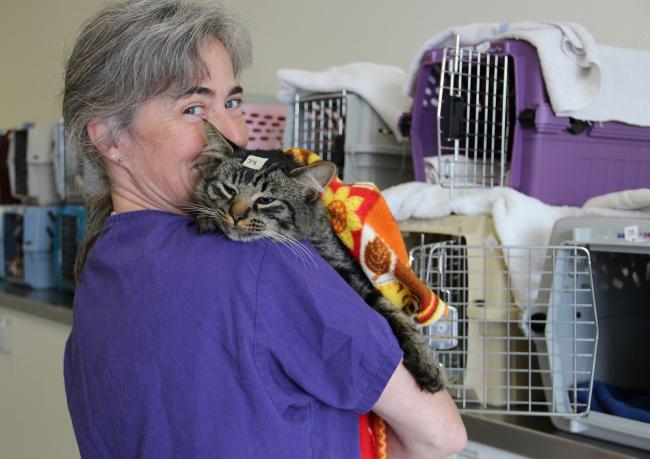A massive adoption project, 60 cats from Burien home
Maria Soriano, clinic manager of Feral Cat Spay/Neuter Project, holding a groggy feral cat just waking up from surgery.
Tue, 09/27/2011
By Gwen Davis
Thousands of abandoned and forgotten cats in Burien finally have a reason to purr.
The Community Animal Resource and Education Society (CARES) of Burien, has undertaken the ambitious task of providing homes and services for over 60 fluffy felines.
Ever since Burien opted out of King County's animal control services, CARES - a nonprofit 501(c)(3) kicked off in June - has the mission of encouraging responsible pet ownership and enforcing animal laws to protect the health, safety and welfare of people and animals in Burien.
"People come to CARES to adopt a cat or a kitten that has been surrendered somewhere," said Debra George, head of CARES. "We are getting more and more people to take a cat into their home."
Recently, CARES has committed to a particularly in-depth challenge: finding new homes for over 60 cats currently living with an individual in Burien. CARES has eagerly jumped into the project and is now aggressively recruiting adopters for all the kitty-cats, as they are slowly removed from the owner over a period of several weeks.
George declined to provide details about the individual.
Eight cats will be removed at a time; the first appointments have been set for Oct. 3 and Oct. 6. CARES is waving the usual $60 adoption fee - money that funds CARES' operations. As such, the organization urgently seeks financial donations, both temporary loans and permanent donations. Supplies are also needed, such as hard-sided plastic cat carriers.
The bundles of kitties will first be taken to the Lynwood nonprofit, Feral Cat Spay/Neuter Project (FCSNP) for fixing. FCSNP is extraordinary in and of itself: the five-person staff spays and neuters 40 to 50 cats per day, with over 9,000 cats being served a year. FCSNP asks owners for a payment of $15 for male cats and $25 for female cats, but no one is turned down due to inability to pay.
The cats are usually feral, but the project treats many family cats, too.
The feral cats come from various organizations and freelancers that trap cats in what's called Trap-Neuter-Release (TNR).
"Groups will bring them here to get them fixed," said Kathy Lapham, spokesperson for the FCSNP. "And depending on the cat and on the group that brought them in, they will be released to where they were, or if they end up being tamed, they may be able to get adopted."
While the cats are in surgery, they additionally get an ear tip, in which the top centimeter of the ear is clipped off. This makes them identifiable to future TNR people, so they are not brought to the vet again.
"If someone traps them or spots them in the future, they notice they have the ear tip and know the cats have already been fixed," Lapham said.
But this all begs the question: how did so many cats come to be feral in the first place?
"The original problem starts with people who abandon their pet cats," Lapham explained. "Somebody leaves their cats and then if they are unfixed, they have babies, and then those babies, have babies and then it becomes a continuous problem."
She also noted that continual living with no human contact creates for family-orientation regression.
"If they are outside for a while, they will become unsociable and will return to the wild state called feral," Lapham said.
Like CARES, FCSNP is a nonprofit and relies on donations and grants for its basic operations, as well as dedicated volunteers. The project has an annual budget of $450,000.
Within the animal-rights community, diverse and often contrasting viewpoints arise regarding the best way to deal with unwanted or feral cats. Some activists argue that feral cats should not be released after trapping and should be put to sleep. Others slam that attitude, saying that feral cats, after being fixed, should be allowed to return to the wild.
But both CARES and FCSNP try to stay out of the politics, and simply work as hard as they can on behalf of the meowing little companions.
"All the 60 cats will have a home," George said. "That's what is needed."
CARES and FCSNP are always seeking volunteers and donors. To inquire about volunteering or donating with CARES, call 206-81-CARES or email buriencares@gmail.com. For FCSNP, email questions@feralcatproject.org.


